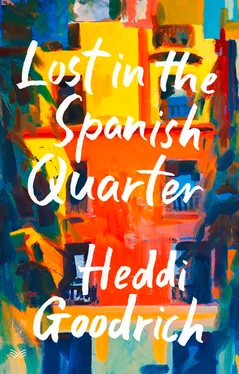Things are good. I’ve found a place where I fit in, I have a great job and new friends that only know as much about me and my past as I’d like them to know. It’s good to hear from you. It’s good to hear you say you’re sorry. Or have I put words in your mouth?
h.
2 Contents Cover Title Page LOST IN THE SPANISH QUARTER Heddi Goodrich Copyright Dedication Chapter 1 Chapter 2 Chapter 3 Chapter 4 Chapter 5 Chapter 6 Chapter 7 Chapter 8 Chapter 9 Chapter 10 Chapter 11 Chapter 12 Chapter 13 Chapter 14 Chapter 15 Chapter 16 Chapter 17 Chapter 18 Chapter 19 Chapter 20 Chapter 21 Chapter 22 Chapter 23 Chapter 24 Chapter 25 Chapter 26 Chapter 27 Chapter 28 Chapter 29 Chapter 30 Chapter 31 Chapter 32 Chapter 33 Acknowledgments A Note from the Translator and Author About the Author About the Publisher
THE DAY AFTER, the day of the hangover, I was sitting on my creaky bed turning the pages of my textbook when I heard Luca coming down the hallway toward me. I could tell it was him even before his voice broke through the mournful Bulgarian folk songs and the humming rain. It was the smell of his tobacco that gave him away. His smoke meandered in through my open door and danced before me as elusively as a wish.
For as long as I’d known him, Luca Falcone had always smoked those hand-rolled cigarettes: he was puffing on one when I was first introduced to him. Leaned against the dejected plaster outside the café across from my department, he was holding something very alcoholic and wearing out-of-fashion leather pants, seemingly oblivious to the historical era or the geographical location he’d wound up in. Luca was already in his third or fourth year and he was pockmarked, weathered like a traveler who had crossed the desert to get to that bar, that bourbon, that stopover.
That moment marked the beginning of my university life as I knew it now, for most unexpectedly Luca took a shine to me and slipped me into his inner circle—the alternative crowd majoring in Urdu or Swahili or Korean at the Department of Arabic-Islamic and Mediterranean Studies and the Department of Oriental Studies, whose remote Italian origins (Puglia, Basilicata, Sicily, Sardinia) branded them as outsiders too.
“The movie’s starting,” said Luca with the lilt of his native Varese, in the Lakes region.
“I’ll be right there. I’m just finishing the page.”
Up close, Luca smelled of lavender soap. He stamped a kiss on my forehead, a big one like he was farewelling me at the train station. Yet he didn’t leave. He lingered in the doorway to bore his eyes into me, as he sometimes did, as if to hypnotize me. That prolonged gaze always threw me into confusion while at the same time giving me the strange certainty, at least for as long as it lasted, that our friendship was not limited to this moment or these circumstances, that we had a bond which would outlast the rest. I knew it was ridiculous, and that I was no exception: everyone wanted a piece of Luca Falcone.
On either side of the now empty doorframe were some of my black-and-white photographs, taken with a macro lens, hand-printed and taped to the wall. They were good shots, though somewhat abstract. Through the window, sandwiched up against another building and transformed by the rain into a game board of Chutes and Ladders, I couldn’t even see my neighborhood being beaten down by the weather and by the passage of time. But it was Sunday and I knew that at that hour all the shops would be closed and the markets packed up, and every last soul would be back home for a marathon meal, followed by the compulsory nap. Sunday lunchtime was the only time when people felt sorry for me. Poor stray, so far from home.
Home. The word itself puzzled me. Didn’t home mean my dad grilling steaks or my psychotherapist stepmom doing her on-the-spot dream analysis? Wasn’t it my mom’s shiatsu foot rubs, her chilly but soft hands, or my brother plucking the bass? The cats? Apparently not, because for all the other out-of-town students home was a place. Colle Alto in the province of Benevento, Adelfia in the province of Bari. Home was a red dot on the map, a reference point that was so very small and yet able to contain, it seemed, everything . People appeared to take it for granted, as if it were just another basic human emotion—happy, sad, angry, home—and yet their eyes lit up when they said the word. Casa . I struggled to grasp that extraplanetary sensation but in the end I couldn’t really feel it. I had to resort to logical analysis to get my head around it.
I was from everywhere and from nowhere. Washington, DC, Maryland, Virginia Beach, the outskirts of Boston, Athens in Ohio, and a few other forgettable stop-offs. That was until, at sixteen, I was assigned a dot on the map by an international exchange program that landed me in the nation of Italy, the province of Naples, the town of Castellammare di Stabia, the apartment of a divorcée with two grown sons who told me to call her Mamma Rita. It was Rita, and not AFSAI, who begged me to stay on after the first year and who had the foresight to advise her “American daughter” to graduate from a liceo linguistico .
I became convinced that nothing in this world is random. It was that diploma, in fact, that got me into the Orientale. The admissions lady had narrowed her eyes. I wasn’t Italian, but with that piece of paper I couldn’t not be Italian. When she thumped my admission form with four glorious official stamps, she turned me into a university student like any other. And among Luca’s friends, who were now mine too, the camouflage was almost perfect.
The boys and I had a fun little game, which would start with a request for a cold beer and usually end with a cup of hot tea.
“Ah, c’mon, gorgeous,” pleaded Tonino that afternoon lying starfish on Luca’s bed. In the spastic light of the TV, I could see that Tonino looked as miserable as the old wallpaper behind him, covered only partially by Luca’s Arabic calligraphy. “If I don’t inject more alcohol into my bloodstream, I’ll never get rid of this bastard headache.”
“You did ask for it,” said Angelo.
“Like you asking for that bong …”
“Listen, boys,” I said, putting on my sternest voice, in no way meant for Luca, who was rolling a cigarette. “You have class tomorrow, bright and early. C’mon, boys, it’s the last week before the break. You can do it! Honey or sugar?”
Tonino cursed half-heartedly in three dialects (Neapolitan, Sicilian, and his own), but they both gave in straightaway. I smiled to myself on my way to the kitchen, knowing full well that what those two really craved was not a drink at all but a bit of mothering. I paused in front of Angelo’s cracked door, catching a peek at his black-and-white cowhide rug we often lay across sipping green tea from Japanese cups while deciphering our respective codes, kanji and Cyrillic. I climbed the staircase, which had lost its railing, swerving at the top to avoid stepping on the crack in the floor, just in case there was some reality to that childhood truth. The fracture started at the fireplace in the kitchen, half a meter out from the wall, and shot through to the end of the living room, dissecting the tiles to where they met the terrace. I wondered, as brazen as that crack was, why I hadn’t noticed it when I’d moved in with the boys. I’d probably been too distracted by the aging beauty of the once luxurious apartment, by all its fireplaces, frescoes, and bas-reliefs flaking and fading in the shadows.
I carried back beer mugs of tea and a pack of cookies; the bed sagged in the middle under our weight. I’d missed the opening scenes, but then again it was a movie we’d watched over and over, a New Zealand film I knew only by the name Una volta erano guerrieri , and I was very familiar with the plot. Tattooed Maori thugs bashing each other at night in parking lots and bars and on green lawns, spattered with blood and foul language dubbed in proper Italian with a northern accent.
Читать дальше












